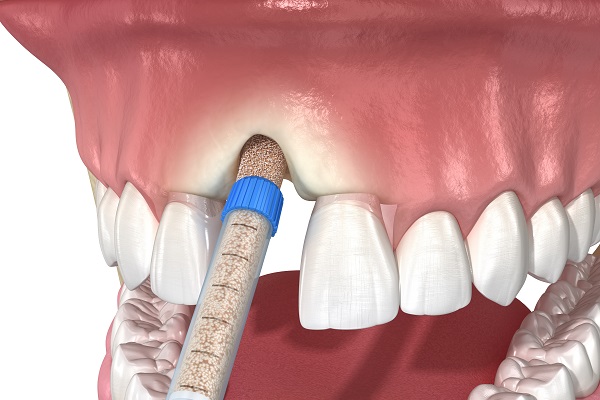Bone Grafting FAQs

When considering dental implants, your dentist may bring up the possibility of bone grafting if they believe that your jaw bone is too thin or soft to support the implant as is, which may cause the implant to fail down the line. Bone grafting is a basic surgical procedure done in the dental office to augment the bone.
Frequently asked questions
Below are some frequently asked questions about bone grafting.
How does bone grafting work?
Performed under local anesthesia, the grafting material is placed into the space left by a missing tooth. Afterward, the body will form new bone cells to replace the graft material gradually over several months.
Why may the procedure be necessary before dental implant placement?
Typically, dental implants should survive a lifetime, but this can only happen if the implant fuses firmly to the jawbone. If there is inadequate bone mass, the success rate of the implant procedure diminishes significantly. Low bone mass happens because the quality and quantity of the bone usually degrade when a tooth becomes missing, although the occurrence is hardly noticeable.
In some situations, when the person is ready to get the dental implants, the remaining bone may not be enough to support the implant. This is the reason bone grafting is necessary. The best choice is to replace a lost tooth as fast as possible and why dentists recommend bone grafting after tooth removal.
What is the source of the grafting material?
The dental expert may obtain the graft material from different sources, including your body. Recently, though, the grafts use synthetic materials and lab-processed bone from a human or animal donor (often a cow).
How safe is bone grafting?
There are no safety threats regarding the grafting material sourced from another part of your bone. However, the drawback of the method is that it requires creating another surgical site: the location where the bone is taken. Mineral bone replacements taken from animal bone or human donor have a minimal threat of infections because they are adequately screened.
The risk level for the two is similar because of the comprehensive and meticulous processing done at the trusted tissue bank. The result is a graft material that is totally safe. The mineral graft materials do not exist independently in the body but naturally dissolve and dissipate into the bone with time.
Is the procedure painful?
The dentist has to create a small incision in the gum to reach the bone under it. This means that you may suffer minimal soreness after the operation. The easiest way to reduce the pain is to apply ice packs on the jaw and use over-the-counter anti-inflammatory drugs and possibly pain relievers.
How long does healing take?
You should be good to go with a day or two. However, the bone regeneration process is only just starting at this point. Within the next few months, your body will keep depositing new bone cells and eliminate the grafting material.
Can the body reject the graft?
This does not happen because the material contains only minerals and no living or genetically coded element. The primary concern is the amount of bone that the body will form as a result of the graft. If the required bone mass is not attained when the graft has fully healed, additional grafting material may be added when placing the implants.
Call us today
If you have more questions about bone grafting, call us today so we can provide you with the information you need.
Request an appointment here: https://www.stratford.premieroralsurgeryct.com or call Premier Oral Surgery & Implantology Center at (203) 760-0190 for an appointment in our Stratford office.
Check out what others are saying about our dental services on Yelp: Bone Grafting in Stratford, CT.
Related Posts
Visiting an implant specialist is essential for patients considering dental implants to replace missing teeth and restore oral function. An implant specialist possesses advanced training and specialized expertise in dental implant procedures, ensuring optimal results and reducing the risk of complications. Consulting with an implant specialist helps patients achieve long-lasting, comfortable, and natural-looking replacements for…
Appearance may be one of the first things people think about when it comes to tooth replacement. However, improved appearance is just one of the many benefits of replacing missing teeth. Tooth replacement can be key to improving not only how you feel about your smile but also boosting your oral health.Whether one chooses dentures,…
While people can feel anxious about certain dental procedures, IV sedation offers a safe and effective way to help patients stay calm and comfortable while allowing a dental provider to complete necessary treatments. No matter how patients feel about dental treatment, avoiding dental care can negatively impact one's oral health. Learning about the benefits and…
Sedation dentistry helps patients stay calm, allowing periodontists to efficiently perform their work while ensuring their patient's comfort and safety. Many people suffer from severe dental anxiety. This fear can stop them from receiving the treatment they need and make their oral health suffer long-term, requiring more extensive treatment. Fortunately, there have been advancements in…
